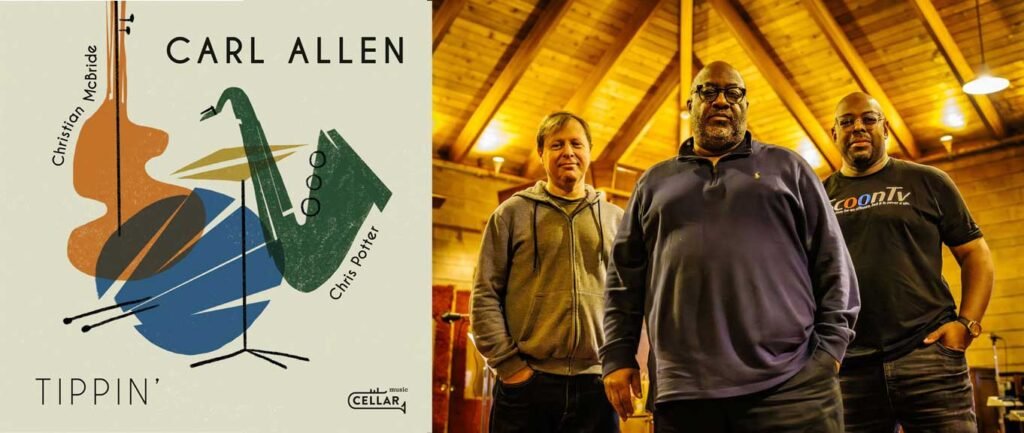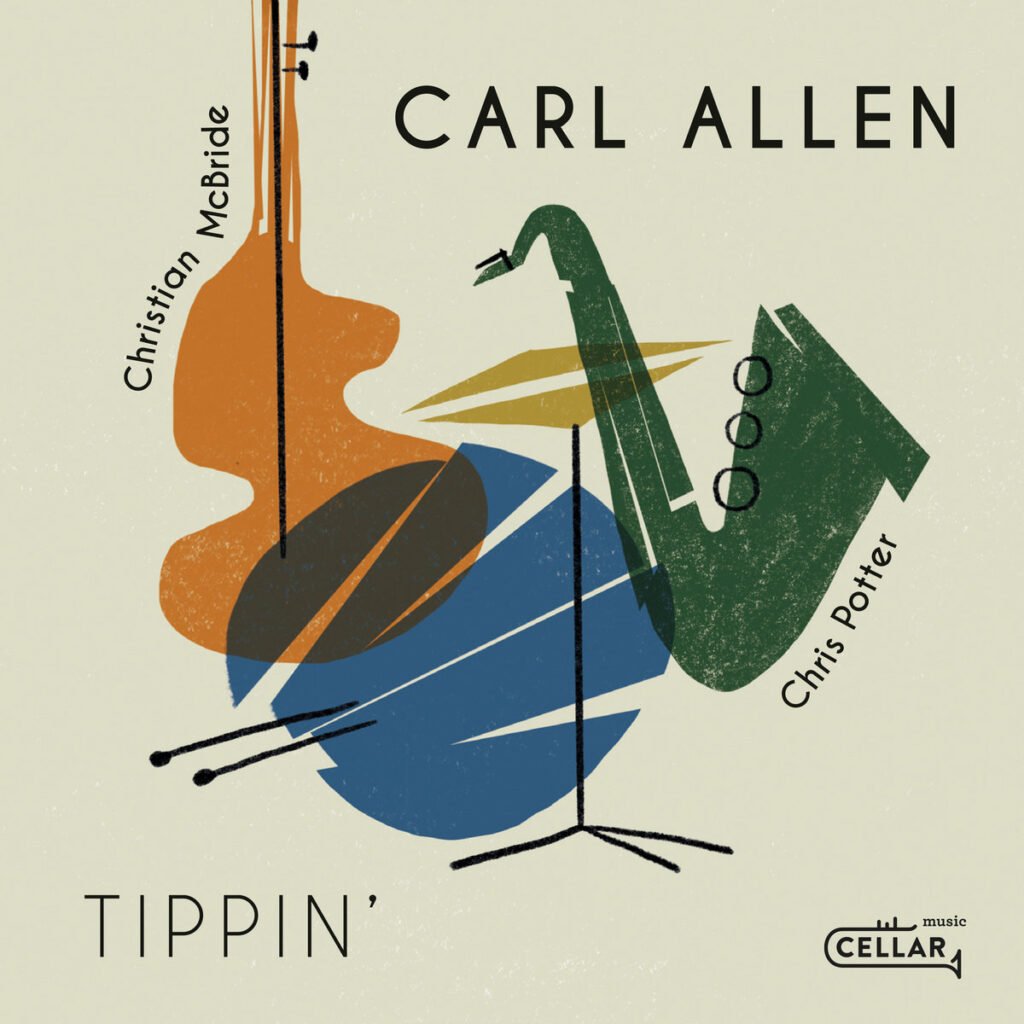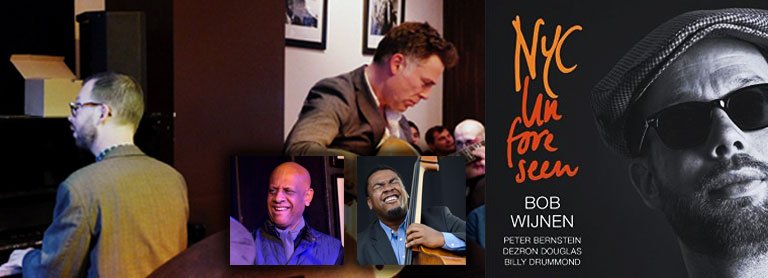Album Review: Carl Allen – Tippin’

with Christian McBride and Chris Potter
Carl Allen’s Tippin’ is exactly the kind of record jazz listeners dream of but seldom get: three virtuosos, Carl Allen (drums), Christian McBride (double bass) and Chris Potter (saxophones and bass clarinet), locked into a chordless trio format, cutting loose in a single, five‑hour shoot at the legendary Van Gelder Studio on January 13, 2024. Carl Allen, making his first leader date in over twenty years, clearly set out to make the album he most wanted to hear, and he more than delivered. The spontaneity of no pre‑session rehearsals, the clarity of Maureen Sickler’s recording, and the sheer chemistry among the three musicians result in a record that crackles with energy, warmth and intelligence and only rarely dips into territory that feels anything less than inspired.
A Dream Team Assembled
Allen knew from the start that Christian McBride was the bassist he needed. Their decades‑long rapport, Allen appears on more of McBride’s records than any other drummer, and the two currently co‑anchor McBride’s Inside Straight, means they function as a single, driving engine. McBride’s tone throughout Tippin’ is colossal: on “Parker’s Mood,” his low‑end support practically shakes the studio floor. Chris Potter was the final piece. Allen’s encounter with Potter on Renee Rosnes’s 2021 Kinds of Love impressed him so profoundly that he envisioned a Sonny Rollins‑style chordless trio. Potter’s fluid command of tenor, soprano and bass clarinet provides the harmonic and melodic weight a piano or guitar might normally offer, while still allowing the trio’s openness to breathe
Recording Live and Unfiltered
The session’s five‑hour window is almost mythic: no charts, no rehearsals, just three masters tuning in to each other’s instincts. That brevity could have resulted in a rushed or tentative session, but instead you hear full‑throttle confidence. Sickler’s engineering at Van Gelder captures every nuance: the snap of cymbals, the woody grit of McBride’s arco, the burnished reed tone of Potter. The recording never feels slick or overproduced; it’s organic, immediate and honest—warts and all, which is exactly how live jazz should sound.
Repertoire and Narrative Arc
Allen curated twelve tracks with a storyteller’s sense of pacing. He kicks off with Charlie Parker’s “Parker’s Mood,” a laid‑back blues that sets the listener at ease and nods to Kansas City’s legacy—no frills, just soul. The program then intensifies with Freddie Hubbard’s “Happy Times,” a propulsive, uninhibited romp that showcases the trio’s ability to ignite when called upon. Lenny White’s “L’s Bop” pushes the tempo even higher, and you can practically feel the adrenaline as each player stretches out.
Interspersed are two Allen originals: “Roy’s Joy,” a swinging salute to Roy Hargrove, and “Hidden Agenda,” a darker blues that Potter colors with haunting bass clarinet. Christian McBride contributes “A Morning Story,” a graceful 3/4 ballad that lets the bass take melodic center stage. Pat Metheny’s “James” and Irving Berlin’s “They Say It’s Wonderful” offer contrasting moods—one a robust, anthem‑like melody, the other a tender, smoky tenor ballad. John Lee’s solitary guest spot on Kenny Barron’s “Song for Abdullah” provides a welcome textural change: the piano’s presence adds warmth and complements McBride’s arco and Potter’s clarinet in a track that feels like the session’s emotional peak. The album closes on Charles Strouse’s “Put On a Happy Face,” a breezy, infectious groove that leaves you smiling.

Standout Moments
Happy Times: A clinical exercise in momentum. Allen’s crisp ride cymbal and McBride’s galloping bass lock the groove, leaving Potter free to unleash fire‑hose lines that never feel chaotic.
Hidden Agenda: The only previously recorded Allen tune here, it gains fresh life with Potter’s bass clarinet. The trio conjures a shadowy blues atmosphere that lingers after the final note.
Song for Abdullah: John Lee’s piano intro is unexpected yet welcome. The track’s gentle lyricism and McBride’s arco support are the album’s emotional core.
Alter Ego: Potter switches to soprano saxophone, delivering a sinuous, dream‑like rendition of James Williams’s tune. The trio’s understated pulse lets the melody soar.
Musical Chemistry and Individual Brilliance
Allen and McBride form one of the tightest rhythm teams in modern jazz. Their interplay is telepathic: Allen can drop back to brushwork or punctuate a phrase, and McBride responds instantly, either locking in or stepping forward with a bass solo that feels both muscular and lyrical. Potter, meanwhile, is the perfect foil. His solos never overstay their welcome; he builds arcs with laser focus, from thoughtful motifs to explosive climaxes. In the absence of a chordal instrument, harmonic choices fall on him, and he handles that responsibility with aplomb —yet always leaves space for the listener’s imagination.
Production Quality
Five hours in a world class studio overseen by Maureen Sickler yields a sound as natural as a live club date. The balance across three acoustic instruments is pristine: Allen’s drums have snap and body, McBride’s bass has warmth and definition, and Potter’s horns are captured with depth and presence. There’s no artificial sheen, no canned reverb or forced theatrics—just three instruments in a room, recorded with respect and clarity.
Educator’s Touch
Allen’s outside role as Director of Jazz Studies at the University of Missouri in Kansas City and his recognition as the 2025 Ellis Marsalis Jr. Jazz Educator of the Year inform the session. You hear a teacher’s ear for pacing and dynamics when to push, when to hold back, how to shape a narrative over twelve tracks. Tippin’ isn’t just a showcase for chops; it’s a masterclass in trio playing and repertoire selection.
Where It Could Be Sharper
A few moments expose the trio’s “on‑the‑fly” nature. On some uptempo numbers, the momentum is so intense that transitions into the head can feel abrupt. A track or two might have benefited from a slightly looser tempo to let the grooves breathe. And while the chordless format is thrilling, there are fleeting instances where a chordal voice piano or guitar could have deepened harmonic textures. That said, these are minor quibbles in an otherwise triumphant session.
Generational Impact
In an era when younger players often default to complex post‑harmonic concepts or electronic gimmicks, Tippin’ affirms the value of swing, melody and pure acoustic interplay. Bands like New Jazz Underground are introducing Generation Z to the trio format, but Allen, McBride and Potter remind us that seasoned masters still have plenty to teach. Their conviction and cohesion are an inspiration, suggesting that chordless trios remain fertile ground for innovation.
Final Verdict
Carl Allen’s Tippin’ is a must hear recording for anyone who cares about straight‑ahead jazz that swings, sings and sparks conversation. It’s enthusiastic without being superficial, adventurous without losing sight of tradition, and honest without being self conscious. You come away not just entertained but invigorated reminded that jazz thrives when musicians listen as deeply as they play. Tippin’ is exactly the record Allen set out to make: one you’ll want to hear again and again.
Peter Antheunis






This is a fantastic album. I am a drummer myself and a Sonny Rollins fan. This album really takes me back to the Sonny Rollins trio records. HIGHLY RECOMENDED!